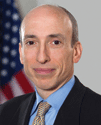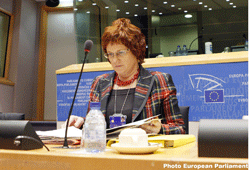Legislators and regulators in the U.S. and Europe have been coming together to ensure conformity on margin rules for bilateral uncleared swaps, according to Gary Gensler, chairman of the Commodity Futures Trading Commission.
| 
Gary Gensler |
In a press briefing this morning following his keynote address at the Futures Industry Association’s Annual Meeting in Boca Raton, Fla., Gensler said he had met with lawmakers on the issue, such as Sharon Bowles, who chairs the European Parliament’s Economic and Monetary Affairs Committee. “Major banks have to have some uniform rules as to how to collect margin,” he said. “You have to know from whom, how much, and when margin needs to be collected [in a globally consistent way.]”
| 
Sharon Bowles |
Additionally, he added that he hoped “we can come together [on the idea that] collateral needs to be held at a third-party custodian, in the name of customer protection.” In the wake of the
MF Global collapse, segregation of customer funds has gained increasing regulatory attention. There are some who worry the costs of third-party custodians will outweigh the benefits.
Gensler added that within the framework of working on these rules in a global forum, the U.S. and European regulatory officials will need to decide when it will be appropriate to substitute compliance of a home country’s regulations for that of Dodd-Frank or the European Market Infrastructure Regulation. In other words, Gensler will have to agree with other regulators as to when some regulations suffice the requirements of Dodd-Frank, without necessarily receiving the same oversight from U.S. regulators.


